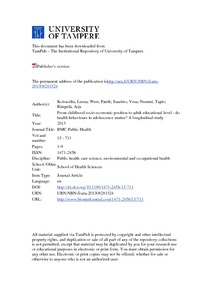From childhood socio-economic position to adult educational level - do health behaviours in adolescence matter? A longitudinal study
Koivusilta, Leena; West, Patrik; Saaristo, Vesa; Nummi, Tapio; Rimpelä, Arja (2013)
Koivusilta, Leena
West, Patrik
Saaristo, Vesa
Nummi, Tapio
Rimpelä, Arja
2013
BMC Public Health 13
711
Terveystieteiden yksikkö - School of Health Sciences
This publication is copyrighted. You may download, display and print it for Your own personal use. Commercial use is prohibited.
Julkaisun pysyvä osoite on
https://urn.fi/URN:NBN:fi:uta-201308281324
https://urn.fi/URN:NBN:fi:uta-201308281324
Kuvaus
BioMed Central open access
Tiivistelmä
Background
Our interest was in how health behaviours in early and late adolescence are related to educational level in adulthood. The main focus was in the interplay between school career and health behaviours in adolescence. Our conceptual model included school career and health-compromising (HCB) and health-enhancing (HEB) behaviours as well as family background. Two hypotheses were tested: 1) the primary role of school career in shaping educational level in adulthood (an unsuccessful school career in adolescence leads to HCB and not adopting HEB and to low educational level in adulthood); 2) the primary role of health behaviours (HCB and not adopting HEB in adolescence leads to a school career with low education in adulthood).
Methods
Mailed surveys to 12 to18 year-old Finns in 1981–1991 (N=15,167, response rate 82%) were individually linked with the Register of Completed Education and Degrees (28 to 32-year-olds). We applied structural equation modeling to study relations of latent variables (family SEP, family structure, school career, HCB, HEB) in adolescence, to the educational level in adulthood.
Results
Standardized regression coefficients between school career and health behaviours were equally strong whether the direction was from school career to HEB (0.21-0.28 for 12–14 years; 0.38-0.40 for 16–18 years) or from HEB to school career (0.21-0.22; 0.28-0.29); and correspondingly from school career to HCB (0.23-0.31; 0.31-0.32) or from HCB to school career (0.20-0.24; 0.22-0.22). The effect of family background on adult level of education operated mainly through school career. Only a weak pathway which did not go through school career was observed from behaviours to adult education.
Conclusions
Both hypotheses fitted the data showing a strong mutual interaction of school achievement and adoption of HCB and HEB in early and late adolescence. Both hypotheses acknowledged the crucial role of family background. The pathway from health behaviours in adolescence to adult education runs through school career. The interplay between behaviours and educational pathways in adolescence is suggested as one of the mechanisms leading to health inequalities in adulthood.
Our interest was in how health behaviours in early and late adolescence are related to educational level in adulthood. The main focus was in the interplay between school career and health behaviours in adolescence. Our conceptual model included school career and health-compromising (HCB) and health-enhancing (HEB) behaviours as well as family background. Two hypotheses were tested: 1) the primary role of school career in shaping educational level in adulthood (an unsuccessful school career in adolescence leads to HCB and not adopting HEB and to low educational level in adulthood); 2) the primary role of health behaviours (HCB and not adopting HEB in adolescence leads to a school career with low education in adulthood).
Methods
Mailed surveys to 12 to18 year-old Finns in 1981–1991 (N=15,167, response rate 82%) were individually linked with the Register of Completed Education and Degrees (28 to 32-year-olds). We applied structural equation modeling to study relations of latent variables (family SEP, family structure, school career, HCB, HEB) in adolescence, to the educational level in adulthood.
Results
Standardized regression coefficients between school career and health behaviours were equally strong whether the direction was from school career to HEB (0.21-0.28 for 12–14 years; 0.38-0.40 for 16–18 years) or from HEB to school career (0.21-0.22; 0.28-0.29); and correspondingly from school career to HCB (0.23-0.31; 0.31-0.32) or from HCB to school career (0.20-0.24; 0.22-0.22). The effect of family background on adult level of education operated mainly through school career. Only a weak pathway which did not go through school career was observed from behaviours to adult education.
Conclusions
Both hypotheses fitted the data showing a strong mutual interaction of school achievement and adoption of HCB and HEB in early and late adolescence. Both hypotheses acknowledged the crucial role of family background. The pathway from health behaviours in adolescence to adult education runs through school career. The interplay between behaviours and educational pathways in adolescence is suggested as one of the mechanisms leading to health inequalities in adulthood.
Kokoelmat
- Artikkelit [6140]
